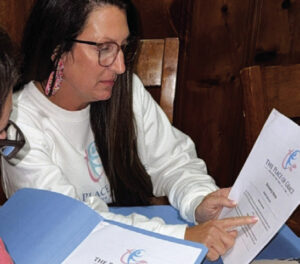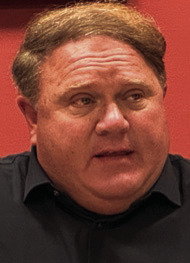Commission discusses one-cent tax change
At Monday evening’s work session, the Franklin County Commission discussed proposed changes to the bi-annual one-cent sales tax that benefits both the county and city school systems.
Franklin County Probate Judge Barry Moore said the commission has discussed the possibility of splitting the one-cent tax, which has been voted in by Franklin County citizens since 2010, with a majority of the tax still going to benefit the schools and a smaller portion going to the county to fund necessary road and bridge projects through the Alabama Transportation and Rehabilitation Improvement Program (ATRIP).
“What we are proposing is splitting the tax 75/25 with 75 percent of the proceeds from the tax going to the schools and 25 percent going to the county in order to fund the projects the county has been approved for through the ATRIP program,” Moore said.
“We have approximately $2.3 million in matching funds that we have to come up with in order to complete all of the projects we were approved for, and we simply do not have that kind of money.”
County commissioner Chris Wallace said the county has stretched its finances as far as possible over the past couple of years through bond refinances in order to come up with the matching funds for the first two rounds of ATRIP projects, such as the recent repaving work completed on Franklin 16, but Wallace said there were no more funds to move forward with future projects.
“The problem is that if we don’t find a source of funding for these future ATRIP projects, we will lose out on that money we were awarded,” Wallace said.
“Our roads, especially in the county, are in bad shape in a lot of places, and there is no way we could get all of the work done that we were approved for if it weren’t for this program, so we don’t need to miss out on this opportunity.”
Moore said the funds generated from the one-cent sales tax in 2012 totaled $2,174,633.48. If the 75/25 split had been in place, the county would have generated nearly $544,000 for the ATRIP projects.
Moore said splitting the one-cent sales tax that has been in place since 2010 was a good solution since it meant no new taxes would be introduced and the schools would still receive a majority of the funds.
“We want people to understand that this is in no way a new tax,” Moore said.
“This is a tax that was voted in by the people in 2010 to help fund the schools and was voted in again in 2012. The tax comes up for a vote every two years and will be on the ballots again in June of 2014.
“We want to make sure the schools still receive this money because we know how important is to their operations, but we also want to work together to utilize the revenue from the once-cent tax in order to fund these road and bridge projects, many of which actually benefit the schools as well.”
Moore said there are currently several bridges in the county that have been deemed unsafe for school buses to travel on that have been approved for repairs through ATRIP.
“Really this will benefit the schools because there are buses that cannot get over some of these bridges or down some of these roads because they are in such disrepair,” Moore said.
“There are roads in terrible condition that students and parents of students travel on daily to and from school.
“We have spoken with school officials and they have been agreeable to the proposed changes in the one-cent tax.”
Currently the once-cent tax is split 57/43 with the county schools receiving 57 percent and the city schools receiving 43 percent.
Russellville City Schools Superintendent Rex Mayfield was present at Monday’s work session and said he would support the proposed changes.
“This one-cent tax is absolutely vital to our school system, and I have spoken with county superintendent Gary Williams and I know that it is vitally important to his school system as well,” Mayfield said.
“It has kept us from having to borrow money and put ourselves in a worse financial situation than we were already in following proration and being cut over $5 million.
“The people of this county have been gracious enough to vote in this tax for the past two cycles in 2010 and 2012, and we hope they will support the schools once again in 2014 when this tax is put back on the ballot for renewal.
“With that being said, I know it is important to work together for the good of the county as a whole, and many of the repairs that would be made through ATRIP would benefit the schools, mainly through our transportation system.
“There are places I know where a county bus goes several miles out of the way to avoid a bridge that it cannot pass over, and that’s wasted money for us when buses are driving several miles each school day that they shouldn’t have to drive. So I will support this change in the distribution of funds.”
Franklin County Schools Superintendent Gary Williams was out of town Monday evening and could not attend the work session, but he said Tuesday that he was also in support of the 75/25 split.
“I don’t think I can emphasize enough just how important this one-cent sales tax is to our school system,” Williams said.
“This has been instrumental in helping us pay down our debt, so we have seen just how vital it is.
“But the road and bridge situation, especially in the county, is something that is also a problem for us and something we deal with daily. We receive complaints on a weekly basis about the terrible roads the buses have to drive on and the bridges that have to be bypassed.
“I think it is very important for us to work together on this issue, especially since the county commission was willing to work with the schools four years ago to get this tax put on the ballot in the first place.”
Commissioner Wyman Pounders said he didn’t want to do anything that would jeopardize the schools receiving the needed funds from this one-cent sales tax.
“This is why we are trying to have an open discussion and inform the citizens about this proposed change,” Pounders said.
“Our roads are probably the number one complaint I have received since becoming a commissioner, and this is the most feasible way to fix this problem. Everybody will win.”
Moore pointed out that the change in funding would not be permanent if it were passed.
“This change would be for the duration of our ATRIP projects, which could take another 4-5 years to complete,” Moore said.
“We would just have to re-evaluate where we are on a year-to-year basis because there are so many projects that have been applied for and approved statewide that it may take more time than we anticipate.”
ATRIP, which was first introduced in February 2012, is the largest road and bridge improvement program in the history of Alabama and was designed to enhance safety and quality of life for people in communities across the state and to serve as an economic development tool since updated roads and bridges will help the state recruit additional jobs from companies that depend on a modern, solid infrastructure to transport goods.
Through ATRIP, 80 percent of the cost for approved road and bridge projects is covered through the use of GARVEE bonds from the Grant Anticipation Revenue Vehicles Bond Program. The remaining 20 percent is the responsibility of the sponsoring municipality.
“Basically you are getting these important road projects completed for 20 cents on the dollar,” commissioner Rayburn Massey said.
“I would hate for us to miss out on that kind of money.”
County highway engineer David Palmer has said many times in the past what a missed opportunity it would be to miss out on having many of these road and bridge projects completed because the matching funds were not available.
“The ATRIP program is something that doesn’t come around every day,” Palmer said.
“This is an amazing opportunity the governor and our legislature has given us to be able to handle the crisis we’re facing at the local level of keeping our roads up to par.
“It would be a shame to miss out on this opportunity to have 80 percent of our approved projects funded just because we couldn’t come up with the 20 percent [match].”
County administrator Crista Madden added it would take 20-30 years for the county alone to complete the same amount of projects that would take 4-5 years to fund through ATRIP if the funds from the one-cent tax were redistributed.
“It really puts it in perspective when you look at it that way,” Madden said.
“We really shot for the moon when applying for these projects because we had no way of knowing what we would and wouldn’t be approved for, but since we were approved for all of the projects, it would be sad to lose out on these repairs and all of this funding, because if we cannot come up with the matching funds, we lose the money we were approved for.”
In order to change the standing one-cent tax to reflect a 75/25 split in funds, a legislative act would have to be introduced and endorsed by local legislative leaders Sen. Roger Bedford and Rep. Johnny Mack Morrow before it could be passed during the next legislative session that begins Jan. 14.
Bedford said he would support the measure if it was something the people of Franklin County wanted.
“Johnny Mack and I, as well as the county commission, want to hear from the people of Franklin County on this issue,” Bedford said.
“We appreciate the county commission and the schools sitting down in an open forum like this and discussing the proposed changes and being open with the people of Franklin County about what they hope to accomplish with these funds.
“We want to do what is best for the county, so we want to hear from our citizens on both sides of the issue, and if this measure has enough support from the people, we will be glad to support it in the upcoming legislative session.”
Moore said any citizen who wished to address the commission concerning this issue was invited to the commission’s next business meeting on Dec. 16 at 8:30 a.m.
Moore said citizens could also call the commission and ask to be placed on the agenda for the next work session on Jan. 13 at 5 p.m.
For those who do not wish to attend either of these meetings, citizens are urged to contact the commission at 256-332-8850 to voice their opinion or contact Bedford or Morrow directly.













